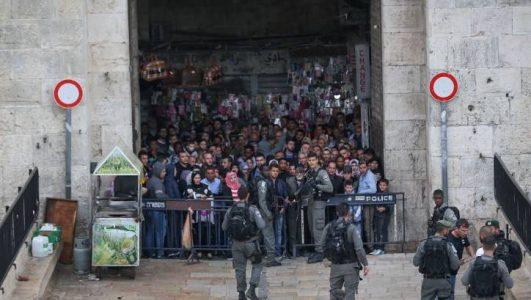
Woman fatally stabbed in Jerusalem amid Good Friday gatherings in Jerusalem
A British exchange student was fatally stabbed Friday by a Palestinian attacker just steps from Jerusalems Old City, where thousands of Jews and Christians gathered for religious holidays at one of the busiest times of the year, officials said.
Thousands of people filled parts of the ancient city: Jews to celebrate Passover, which ends Monday in Israel; and Christian pilgrims for Good Friday. The attack took place inside a car of the citys light-rail train near the entrance to the Old Citys Christian Quarter.
The woman, identified as Hannah Bladon, 21, was treated for stab wounds in a hospital and later died, police said.
Bladon was an exchange student from the University of Birmingham in Britain, and she arrived in Israel in January to spend a semester at the Hebrew University of Jerusalem, the latter said in a statement.
Israels Shin Bet security agency named the suspected attacker as 57-year-old Jamal Tamimi from East Jerusalem, a mostly Arab area. They said he had mental health issues and had attempted suicide this year while hospitalized. Tamimi was arrested at the scene, the report said.
Israeli Prime Minister Benjamin Netanyahu compared the attack to other violent acts around the world in recent weeks. Radical Islam strikes at the capitals of the world and, unfortunately, terrorism has hit the capital of Israel Jerusalem, he wrote on Facebook.
Israel considers Jerusalem its united capital, and all of its official offices are based there. Palestinians want part of Jerusalem as the capital of any future state.
Fridays killing is the latest in a spate of stabbing, shooting and vehicular attacks by Palestinians over the past 18 months.
Israel has been accused internationally of being too heavy-handed in response to the attacks, which have left nearly 50 Israelis and more than 200 Palestinians dead. Israel says most of the Palestinians killed were attempting to carry out attacks against Israeli civilians, soldiers or police officers.
The targeted stabbings and other attacks started in October 2015 with almost daily assaults. Incidents slowed in mid-2016 and, with Israeli forces stepping up their response, fatal attacks are now rare.
The violence contrasts with the first and second intifadas of the 1980s and 2000s, which were centrally organized and included mass unrest.
Source: /Washington Post





